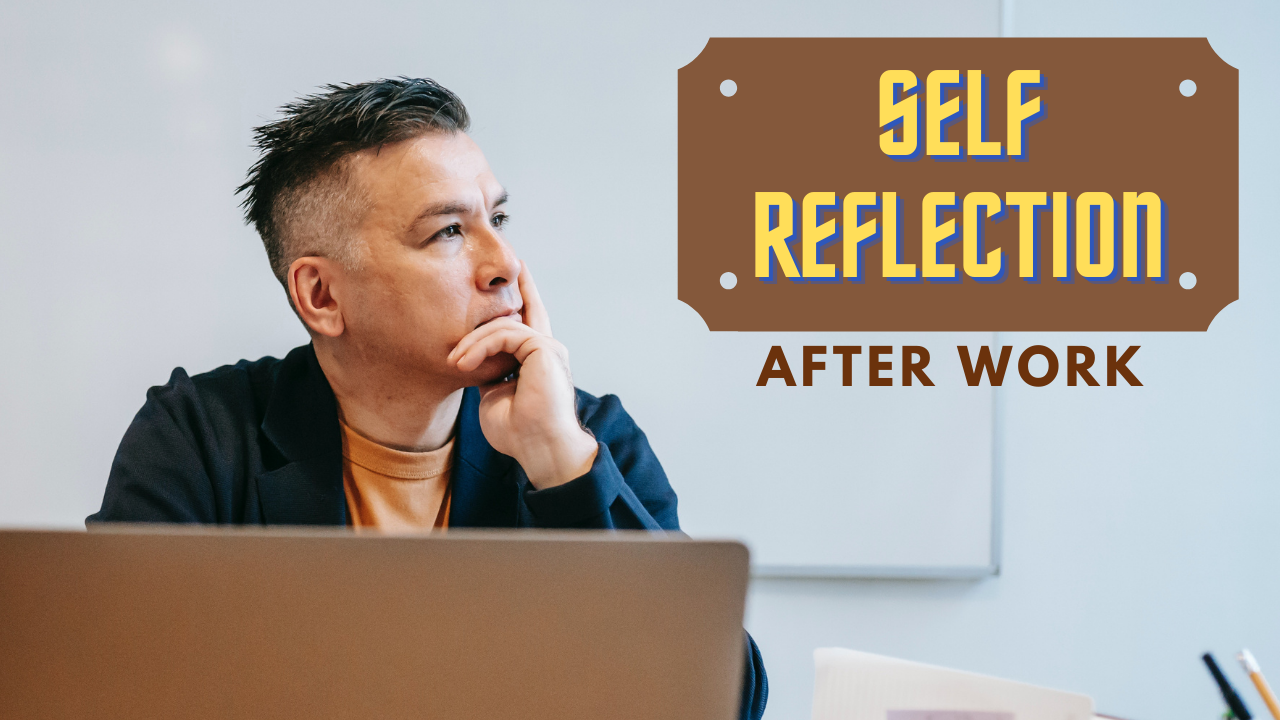Work reflection has been studied by researchers for a long time. It entails thinking about positive and negative events at the workplace. Let us try to understand a bit more in this essay about self reflection after work.
Contents
What is work reflection?
Work reflection refers to cognition about the events and interactions of the workplace during non-work or leisure hours. It usually has two components:
- A cognitive component: The individual engages in active thinking about work events. Therefore, they expend cognitive energy and resources during non-work hours for work-related activities.
- An affective component: The emotional by-products of engaging in cognition about work events. Such emotions include pride, guilt, embarrassment, positive affect, negative affect, and many more.
We discuss two types of work reflection in this essay on self reflection for the workplace. The first involves reflecting on the positive aspects and events of the workplace. For instance, employees may reflect on a successful client meeting and take notes about the strategies that enabled them to negotiate a win-win deal. The second type involves reflecting on the negative aspects and events of the workplace. For instance, employees might think about how their boss humiliated them in front of the entire team for a grammatical error during a presentation.
It is evident that the two forms of self-reflection would yield entirely different sets of emotional and behavioral outcomes. Positive work reflection during non-work hours and weekends could result in better resource recovery, better sleep quality, positive affect, and greater life satisfaction. On the other hand, negative work reflection is more likely to result in burnout, mental fog, poor sleep quality, and diminished overall health quality. In this essay about self-reflection, we emphasize the importance of the quality of reflection as well. You should focus on positive thoughts more, even though your attention may go to negative thoughts from time to time.
Why is work reflection important?
Despite having mixed outcomes, self-reflection is a crucial aspect of every individual’s life. Imagine a scenario where we did not reflect on what we did and how we did. Would we not reach a quasi-static state? We would not feel any emotions with respect to our work and what is life without emotions? Hence, for our own personal benefit, we need to engage in both positive and negative work reflections. While positive work reflection makes us feel good about ourselves, negative work reflection gives us scope for improvement. Recall our earlier example of the boss who humiliated the employee. Although there are better communication strategies that the boss could have used, the employee would now be extra cautious about grammatical and typographical errors during work presentations.
In addition, all emotional states (both positive and negative) serve important functions in our lives. Imagine a situation where you got into trouble for over-speeding your vehicle. If you do not reflect on it and experience guilt about almost killing yourself and other people, you would probably forget about it and over-speed again in the future. However, if you reflect on it and realize your mistake and the situational factors that led to the accident, you would be careful next time. As a result, your driving skill would improve.
► Pro Tip: don’t overdo it
Frequent harsh appraisals of the self often lead to persistent negative moods. This is especially true for individuals with low self-esteem. Individuals with low self-esteem enter a vicious cycle of brooding and self-blame when they engage in too frequent negative reflection. On one hand, they have an inherent tendency to perceive the self in a negative light, and on the other hand, negative events actually happen to them. Additionally, research suggests that we often make more mistakes when we ride the highs and lows of the emotional rollercoaster. Hence, such individuals are more likely to make errors in the workplace, which gives them scope for further negative reflection.

The benefits of positive work reflection
Positive reflection has been associated with numerous positive outcomes like happiness, positive affect, life satisfaction, better sleep quality, and better physical and mental health. A research study found that employees who engaged in positive reflection during a weekend vacation experienced lesser exhaustion, fatigue, and burnout as compared to employees who did not reflect and those who engaged in negative reflection. However, the downside is that the positive impact of positive reflection did not have temporal longevity. In other words, employees soon returned to the base level of positive emotions within 14 days of returning from the vacation. Therefore, employees need to actively practice positive reflection in order to reap the benefits in the long run. Positive reflection interventions like mindfulness training have been shown to enhance the ability to perceive the light at the end of the tunnel.
The cons of reflection: A Conservation of Resources Approach
The conservation of resources theory (Hobfol, 1989) states that individuals have a fixed repository of resources. If we expend more resources on one activity, we automatically have lesser resources for other activities. Hence, if we spend too much time reflecting on work events during our non-work hours, we are less likely to have time and energy for household chores and leisure activities. Both of them have great importance in our lives.

If we are not able to find time for household chores and family activities, we face work-family conflict. Work-family conflict is a major source of stress and burnout in today’s age of dual-career families. Leisure activities help us define our identity and give us motivation and energy for other activities. Hence if we are unable to find time for leisure, we end up being exhausted. Therefore, engaging in both forms of reflection have the disadvantage of leaving us exhausted.
New Trends in Work Reflection
The global pandemic has made our lives difficult. While we are working from home, the boundaries between work and non-work activities and hours have become blurred. Most employees claim that they are working for extra hours and feeling exhausted and over-burdened. The situation is more challenging for dual-career couples with kids. In such a situation, we hardly have time for conscious work reflection. Therefore, in this essay on self-reflection for work, we suggest some easy interventions.
read our guide to making your work from home life easier
These are less likely to have an impact on your ability to reflect positively or negatively. Hence, we have to take charge of the situation ourselves. Firstly, while remaining aware of the consequences of the disease, we need to reduce the negative talk. Secondly, we have to adopt the method of time blocking. Most employees are ending up working extra hours because they are not able to define the boundary between work and family due to the absence of physical distance. If we block time for activities beforehand, we would have time for all activities. Remember most of us are saving hours of commute time. Since reflection is important, we need to block some time to take a quick walk and reflect on the happenings of the day. A conscious effort to do so for a few days would lead to the formation of a good habit.
